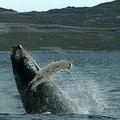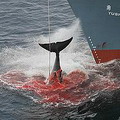 國際捕鯨委員會(IWC)6月27日起在智利聖地牙哥召開年度會議,令人遺憾的是這會議沒有任何新的建樹,保育與捕撈的歧見依舊是各國政府跨不過的鴻溝。
國際捕鯨委員會(IWC)6月27日起在智利聖地牙哥召開年度會議,令人遺憾的是這會議沒有任何新的建樹,保育與捕撈的歧見依舊是各國政府跨不過的鴻溝。
各國在會議中避免投票表決,希望能夠透過協商達成共識,因此花了大半時間討論組織的未來規劃,僅出現短暫的意見相左。
這項避免表決的策略,是由IWC主席、同時擔任美國代表的霍格斯(William Hogarth) 所提出與主導的。霍格斯曾任美國海洋漁業部的高級官員,現任南佛州大學海洋學院的院長。避免表決的策略,主要是為了建立立場不同國家間的互信。
因為丹麥要替該國格陵蘭原住民爭取10頭座頭鯨的限額,他們堅持交付表決,導致了避免表決策略的宣告失敗。這個提案最終沒有過關,但相關的討論卻讓這81個會員國陷入與以往一樣的爭執中。
鯨豚保育協會(Whale and Dolphin Conservation Society)是一個國際保育組織,總部設在英國,他們的代表費雪(Sue Fisher)表示:「聽到座頭鯨在歐洲水域安全的時候,我們鬆了一大口氣,如果採行該規劃不良的提案,讓原住民的維生漁業加入商業元素,會立下一個糟糕的先例。」
在激烈的討論後,在歐盟國家21個會員國中有20張反對票,丹麥長期為了該國自治省格陵蘭多方遊說,這回在沒有法律責任下投了贊成票。
鯨豚保育協會站在科學立場反對該提案,因為格陵蘭無法證明他們需要更多的鯨魚肉來作為維生的需求,他們甚至連現在的配額都無法用完。
巴西、阿根廷與南非2008年再一次撤回了「南大西洋鯨魚保護區」的提案,用以表示他們願意作為良好的夥伴,為改造IWC效能努力。
 在特殊捕鯨執照這個爭議性議題上面,如致死性研究用撈捕,IWC的科學委員會2008年採行了一個新的方法來審查這些執照。
在特殊捕鯨執照這個爭議性議題上面,如致死性研究用撈捕,IWC的科學委員會2008年採行了一個新的方法來審查這些執照。
在協會的背書下,JARPN II將成為該方法的首項計畫。擁有特殊捕鯨執照的日本,在2007年間,他們在JARPA II下捕撈了551頭南極小鬚鯨,在北太平洋捕了207頭小鬚鯨、100頭塞鯨、50頭布氏鯨與3頭抹香鯨。
特殊捕鯨執照如往年一樣是個極受爭議的話題,正反方都提出了強烈的意見。日本代表團說現況對所有成員國來說都不好,而IWC需要對此正常化。
日本認為因為IWC各成員國間嚴重的歧見,難以進行建設性、理性又科學的的討論與決策,IWC現在的情況可說是完全失效。
鯨魚正面對日益嚴重的威脅,包括日本、冰島與挪威的擴大撈捕,保育團體為IWC未能對此做出回應感到憂心。
下回IWC的年度會議將於2009年在葡萄牙舉行。
The International Whaling Commission wound up its annual meeting here Friday without achieving new protections for whales or resolving the deep rifts that divide the member governments into pro-whaling and pro-conservation factions.
The meeting centered on the future of the commission with only brief clashes between the two factions, due to a strategy of avoiding votes and attempting to reach consensus through discussion.
The "no votes" strategy was created and guided by the IWC chairman and U.S. commissioner to the IWC, Dr. William Hogarth, a former top official in the National Marine Fisheries Service, who now is dean of the College of Marine Science at the University of South Florida.
It was intended to rebuild trust between the opposing factions in an effort to modernize the IWC for the future.
The strategy failed Thursday when Denmark insisted on a vote to increase by 10 the number of humpback whales Greenland whalers could kill as part of the country's aboriginal subsistence whaling program.
Discussion of the proposal, which was defeated, plunged the 81 nation membership of the commission into a heated debate similar to past conflicts.
"We are extremely relieved to know that humpback whales are safe from hunting in European waters. The adoption of this flawed proposal from Greenland would have set a terrible precedent for allowing commercial elements in aboriginal subsistence hunting," said Sue Fisher of the Whale and Dolphin Conservation Society, an international organization based in the UK.
Following intense negotiations, the Member States of the European Union agreed that 20 of the 21 members present would oppose the proposal. Denmark voted yes under a legal exemption an has been lobbying hard to obtain the increased quota for Greenland, a self-governing Danish province.
The Whale and Dolphin Conservation Society opposed the Greenland proposal on scientific grounds and on the basis that Greenland had not made a convincing case that it needed more whale meat to meet its subsistence needs. Currently, Greenland fails to take all the whales from its existing quota.
Once again this year, Brazil, Argentina and South Africa agreed to withdraw their proposal for a South Atlantic Whale Sanctuary with the hope that it would be taken as a sign of good faith that they are willing partners in the shaping of the IWC into an effective agency.
On the contentious issue of special permit whaling, such as lethal research whaling despite a global moratorium on commercial whaling, this year, the IWC Scientific Committee presented a new method for the review of such permits.
The new process will be used for the first time to review the results of the JARPN II programme. The Commission endorsed this process.
Under Japan's special permit whaling programs, in 2007, a total of 551 Antarctic minke whales were taken under the JARPA II program, while 207 common minke, 100 sei, 50 Bryde's and three sperm whales were taken under the JARPN II program in the North Pacific.
The issue of special permit whaling deeply divides the Commission and as in previous years, strong statements both in favor and against lethal research programs were made.
The Japanese delegation said it is "strongly convinced" that the current situation is undesirable for all members and that the IWC must be normalized.
Japan is of the view that "due to serious disagreements among different groups within the IWC, there has been a paucity of constructive, rational and science-based discussions and decisions. Such state of affairs can only be described as dysfunctional."
Conservation organizations expressed concern that the meeting failed to address growing threats to whales, including increasing whaling by Japan, Iceland and Norway.
The next IWC annual meeting will be held in Madeira, Portugal in 2009.
全文及圖片詳見:ENS




